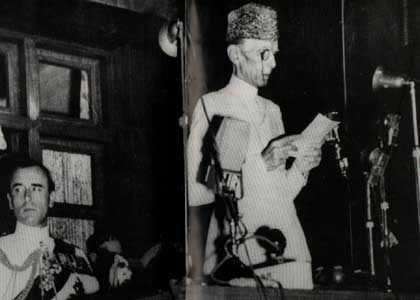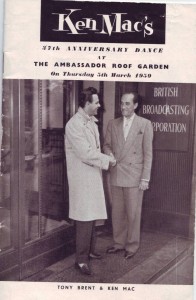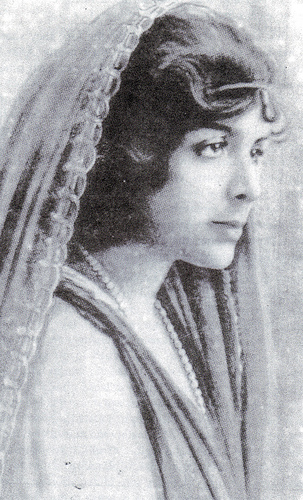 On the evening of August 14, 1947, “the Karachi Club, hosted a grand independence banquet (800 covers were laid) where the cities crème de la crème jostled to felicitate the Quaid”, as Pakistan’s first leader Mohammed Ali Jinnah was known. So began a letter by Mohammed Aziz Haji Dossa that ran in Dawn earlier this week. The newspaper, like the nation it serves, was founded by Jinnah.
On the evening of August 14, 1947, “the Karachi Club, hosted a grand independence banquet (800 covers were laid) where the cities crème de la crème jostled to felicitate the Quaid”, as Pakistan’s first leader Mohammed Ali Jinnah was known. So began a letter by Mohammed Aziz Haji Dossa that ran in Dawn earlier this week. The newspaper, like the nation it serves, was founded by Jinnah.
From the Dawn website, I couldn’t figure out whether the letter, titled “Remembering Ruttie Jinnah”, was part of a continuing debate about Jinnah’s Parsi wife, but Dossa included a reference that will delight jazz lovers. He quotes a portion of Tai Yong Tan and Gyanesh Kudaisya’s compilation The Aftermath of Partition in South Asia to remind us that “Ken Mac, the musician and conductor who performed at the Cricket Club of India in Bombay, had been flown by a special Tata Airlines plane to perform at this special event”.

The book notes: “The Karachi Club had been established in 1934 by the elite Hindu Amil community, mostly from Shikarpur, the Bohri Muslim community and old titled Sindhi families…Jinnah arrived with his sister Fatima for the banquet and was received by the Club’s president Justice Tyabji and its honorary secretary Jethanand Tandon. They were led to the other guests, who included cabinet members, the diplomatic corps, the commander-in-chief, Sir Douglas Gracey, British civilian and army officers, Pakistani officers like Iskander Mirza, all resplendent in cummerbunds or dress suits with ladies in colorful saris and evening dresses. At the sit-down dinner around the teak dance floor, they were serenaded by Ken Mac and his band.
 “Haji Bhai Esmail Dossa, a Bombay-based businessman, recalls the highlights of the evening: Sir Ghulam Hussain Hidayatullah requested Ken Mac to play So Deep Is the Night because on that Chopin tune, Ruttie had taken Jinnah’s consent for marriage in Bombay’s Taj Mahal Hotel, ballroom, at her birthday party, on Feb 20, 1918. Later the Quaid requested the orchestra for Paul Robson’s The End which, as a courtesy to the Quaid, was sung in the tenor voice by the great Ken Mac himself, for it was known that the Founder used to hum the words of The End on Thursday afternoons in Bombay that he devoted to visit the grave of his wife Ruttie, in the Khoja Shiite Isna’asheri Cemetery of Bombay.
“Haji Bhai Esmail Dossa, a Bombay-based businessman, recalls the highlights of the evening: Sir Ghulam Hussain Hidayatullah requested Ken Mac to play So Deep Is the Night because on that Chopin tune, Ruttie had taken Jinnah’s consent for marriage in Bombay’s Taj Mahal Hotel, ballroom, at her birthday party, on Feb 20, 1918. Later the Quaid requested the orchestra for Paul Robson’s The End which, as a courtesy to the Quaid, was sung in the tenor voice by the great Ken Mac himself, for it was known that the Founder used to hum the words of The End on Thursday afternoons in Bombay that he devoted to visit the grave of his wife Ruttie, in the Khoja Shiite Isna’asheri Cemetery of Bombay.
“The finale of the evening was given to the music Happy Birthday Dina, because the Quaid had chosen the Independence Day of Pakistan on the birthday of his only daughter Dina, whom he had left behind in Bombay, with her two children Nusli and Diana. And when the programme ended, the Quaid stood up, the guests followed, and everyone lifted their glasses, to toast God Save the King.”
 Ruttie Jinnah, the only daughter of the textile magnate Dinshaw Petit, died in a room in the Taj in 1929. “The Flower of Bombay, as she was known, fell in love with Jinnah when she was only 16 and, against her father’s wishes, married the lawyer at 18,” noted Dwarkadas Kanji’s Ruttie Jinnah: The Story of a Great Friendship. “She was a strong nationalist. On being introduced to Lord Chelmsford, she did not curtsey to him in the acceptable British way but chose to greet him with an Indian namaste. The Viceroy told her, ‘Mrs Jinnah, your husband has a great political future, you must not spoil it. In Rome, you must do as the Romans do.’ She retorted, ‘That’s exactly what I did, your Excellency. In India, I greeted you in the Indian way.’”
Ruttie Jinnah, the only daughter of the textile magnate Dinshaw Petit, died in a room in the Taj in 1929. “The Flower of Bombay, as she was known, fell in love with Jinnah when she was only 16 and, against her father’s wishes, married the lawyer at 18,” noted Dwarkadas Kanji’s Ruttie Jinnah: The Story of a Great Friendship. “She was a strong nationalist. On being introduced to Lord Chelmsford, she did not curtsey to him in the acceptable British way but chose to greet him with an Indian namaste. The Viceroy told her, ‘Mrs Jinnah, your husband has a great political future, you must not spoil it. In Rome, you must do as the Romans do.’ She retorted, ‘That’s exactly what I did, your Excellency. In India, I greeted you in the Indian way.’”
Dossa’s letter to Dawn can be found here.

